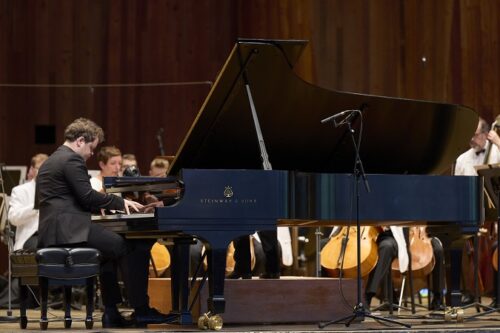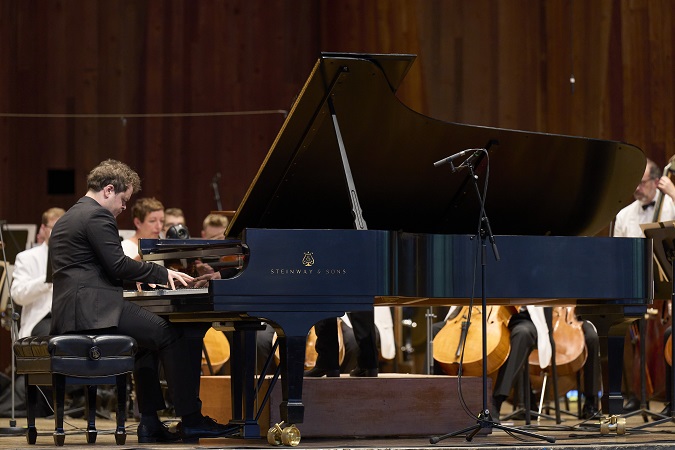 United States Blossom Music Festival 2022 [1] – Various: Benjamin Grosvenor (piano), Cleveland Orchestra / Elim Chan (conductor). Blossom Music Center, Cuyahoga Falls, Ohio, 9.7.2022. (MSJ)
United States Blossom Music Festival 2022 [1] – Various: Benjamin Grosvenor (piano), Cleveland Orchestra / Elim Chan (conductor). Blossom Music Center, Cuyahoga Falls, Ohio, 9.7.2022. (MSJ)

Weber – Overture to Der Freischütz
Liszt – Piano Concerto No.1 in E-flat major
Rimsky-Korsakov – Scheherazade Op.35
I have seen conductors play it safe when making their debuts with the Cleveland Orchestra. After all, it is one of the world’s greatest ensembles, and it must be terrifying for a conductor to face such an accomplished group of musicians. And, on paper, this summer concert from the Blossom Festival looked pretty safe.
Then Elim Chan suddenly lowered her arms to start Weber’s Der Freischütz overture without giving an upbeat. The orchestra’s first entrance was not uniform, not squeaky-clean. It caught my attention, because it is almost a given that the first thing you hear in a concert will be tidy. But this wasn’t.
It seemed unlikely that Chan, an accomplished 35-year-old conductor and previous winner of the Donatella Flick Competition, doesn’t know how to give an upbeat. It is not like she is as technically limited on the podium as the nevertheless beloved Vladimir Ashkenazy, who used to give entire concerts in Cleveland without a discernable in-tempo upbeat to prepare the musicians. The orchestra loved him anyway for his sheer passion for music, and they made up for his technical shortcomings.
There was no technical lapse here. Within moments, it was clear that Chan could, and did, give proper upbeats when she wanted to. But the lack of one at the very beginning was an intentional choice. Instead of a routine in-tempo flick leading to a routine opening, she took a risk. Yes, it resulted in an uneven entrance, but it also flipped a switch forcing the orchestra to watch her closely, and the video screens in the Blossom pavilion gave the audience a chance to see just how much Chan led the orchestra with her alert eyes and expressive face.
I think this is an intentional move that a number of younger conductors are making in response to the generation of conductors now leaving the scene. After all, one can recall any number of concerts by Lorin Maazel where his baton technique was detailed and informative, while his face looked bored and the performance never sparked to life. In key places throughout the concert, Chan shifted the focus from the tip of her baton to her face, not just cuing and setting the tone of passages with her eyes but also reacting to what she heard in a way that kept constantly engaging with the players. I’ll take engagement over bored technique any day.
And thus, Chan was able to bring life to that repertory chestnut, Scheherazade. It is a work that I learned early in my classical listening, starting around age 12 with a vinyl record by Mario Rossi and the Vienna State Opera Orchestra acquired at a thrift shop. Subsequent discoveries included the riveting Fritz Reiner recording from Chicago. But as years went by and more and more recordings of the piece accumulated in my collection, I grew bored and started avoiding it.
I was recently called upon to give a pre-concert talk about the work for the Mansfield Symphony, a good regional ensemble in Ohio, and in preparation, I dug deep into the piece, attempting to listen to it as if I had never heard it before. I tried to examine how Rimsky-Korsakov made it work on both an absolute-music level and on a programmatic level. In the end, I found myself falling in love with the piece all over again, and admiring the composer’s ability to make it work on multiple levels. For instance, while it is a suite, there is something quite brilliantly symphonic about the way that all the themes are derived to some degree from the two main themes, one representing the murderous Sultan Shachriar, and the other picturing Scheherazade, the new wife who spins tales for 1,001 nights to diffuse the sultan’s plan to dispose of her.
John Adams recently wrote Scheherazade 2.0 to examine the story from the woman’s point of view, considering how grossly misogynistic the sultan’s character is, and it is also a masterpiece, albeit a much darker one. Yet, a fine performance of this piece tunes in to the fact that the Russian composer was quite ahead of his time, for the key moments of this Scheherazade really see the woman’s point of view. For instance, one can hear Scheherazade flattering the sultan by patterning the character of Sinbad the Sailor in the first movement after the Sultan himself. Rimsky-Korsakov makes Sinbad’s theme a variation of the sultan’s theme.
Even more subtle is the second movement’s ‘Tale of the Kalendar Prince’, where the wandering mystic’s theme is actually related to Scheherazade’s own theme. You can hear Scheherazade drop her mask as storyteller and identify with her character in a violin solo near the end of the movement, but then she realizes her mistake and the melody quickly switches over to solo horn and then cello, as if to conceal her misstep. But it is too late: the sultan has realized his storyteller identifies a little too much with the Kalendar Prince, who is free to wander the countryside. We hear the sultan’s theme approach in a crescendo and accelerando that grows to a terrifying rage to end the movement. Many conductors don’t seem to get it: this is a moment of the utmost danger. Elim Chan got it. She drove that climax so hard, the festival audience sat back, stunned, not breaking into applause at the loud ending.
The third movement Prince and Princess were given color and sweep, while the finale was fast and fiery. It was so effective, I can only nod in approval at the occasional dramatic touch not in the score, such as the very heavy accent on the low bass note just before the second violin solo of the finale.
And the solos! As the orchestra’s newly appointed concertmaster will not start this fall, and Associate concertmaster Peter Otto was out of town, the solos would fall to one of the assistant concertmasters. Amy Lee was originally announced as violin soloist, and her name was printed in the program, but the scannable QR code posted around the facility took one via smart phone to an updated digital program which informed us that assistant concertmaster Stephen Tavani would be playing. If he was a late substitution, you couldn’t tell. He brought Scheherazade to rich life without overdoing it. Indeed, he balanced a silky tone with a forward-moving drive that kept the long solos dramatically focused. It was a shining moment for Tavani, who has only been with the orchestra since 2018. It also demonstrates the depth of quality within the section.
Another spectacular section is the Cleveland Orchestra’s woodwinds, who were featured in numerous solos throughout the evening. Particularly outstanding were the clarinet and bassoon solos, the instruments most featured by Rimsky-Korsakov. Hearing great players inspired beyond routine excellence into full dramatic life was a treat.

And the same can be said about the guest soloist of the evening, English pianist Benjamin Grosvenor, who relished the flair of Liszt’s First Piano Concerto. The piece was designed to demonstrate the pianist’s virtuosity, but Grosvenor showed the additional discernment of distinguishing between what was architecture and what was decorative filigree. Some pianists approach the work as all one way or the other, while Grosvenor gave it dramatic shaping without mistaking the decorative parts for being as important as the structural turning points. This approach kept the piece from meandering yet, despite his thoughtfulness, Grosvenor never forgot to tear into the dramatic parts, then pull back to breathtaking pianissimos. All the while, he unreeled this tremendous balancing act without any attention-grabbing histrionics. He plays like he is speaking to you through the notes.
It would be a mistake to say that Grosvenor did not show emotion on his face, though. The reverse-angle camera on stage (to the pianist’s left) caught just how closely the pianist engages both with the conductor and sections of the orchestra. It was a tremendous performance, and the only disappointment was the lack of an encore, for Grosvenor’s art is one to be savored. It is true that there are a lot of fine pianists in the world today, but he really is one of the best, thanks to his ability to unite the excitement of virtuosity and the insight of thoughtfulness.
Mark Sebastian Jordan

Magnificent review Mark.
You’d have to turn the volume as far up as it goes, but I think Temirkanov particularly gets the darkness of Scheherazade’s vision.
https://www.youtube.com/watch?v=NDWhve__WlE
…I’d also recommend a certain conductor we aren’t listening to right now.
Lorin Maazel’s Cleveland legacy, while variable at times, had many triumphs. In particular, the Blossom programming was far better during the Maazel era than anytime since, especially now. Also, after listening to the Cleveland’s latest Strauss release with FWM, which this site surprisingly gave an enthusiastic review, I returned to the prior 3 Don Juan recordings with Ashkenazy, Maazel and Szell. I prefer all 3 of them (and the Maazel in particular) over the latest version. That one has some impressive solo work to be sure, but the ensemble sounds loose by Cleveland standards and transitions rushed. I fault the conductor. Maazel back in the day never would have released (or made) a recording of such dubious caliber. Stereophile recently published a review highlighting the technical problems. [Edited]